#xiaoshi Poem
Explore tagged Tumblr posts
Text





Heroes week 2023: point of no return
Pablo Neruda: Clenched Soul, Here I love you, Absence / Ehsan Sehgal: The Terms of Evil / Ben Ladouceur: Wanting it darker / Camille T. Dungy: this beginning may have always meant this end / original drama quotes
#heroesweek23#说英雄谁是英雄#heroes#heroes 2022#bai choufei#wang xiaoshi#choushi#su mengzhen#my edit#i think it's like wxs said; the real point of no return was the moment they set foot in the capital#they tried to “escape” a few times but to no avail#anyway i always liked these posts with combined quotes and poems so i wanted to make one too :3
13 notes
·
View notes
Text
“黄鹤楼中吹玉笛,江城五月落梅花。” From within the Yellow Crane Tower sounds a jade flute's notes; the melody comes to life, as if plum blossoms were truly falling in the city of Jiangxia mid-May. 如果王小石不是因慕黄鹤楼之名,借路过特意在湖北逗留,游览一下这名楼胜景,就不会见到白愁飞。 If Wang Xiaoshi did not take advantage of his passing travels to specifically stay in Hubei and view the wonderful scenery of this famous tower - all because he admired the Yellow Crane Tower of renown - he would not have seen Bai Choufei. 假使他没见着白愁飞,那么往后的一切就不一定会发生。就算发生,也肯定会不一样。 Suppose he hadn't seen Bai Choufei - then everything that came after may not necessarily have happened. Or even if it did happen, it would definitely not be in the same way. 人生其实就是这样,无意中,多看一眼,多听一句话,可能会造成极大的改变。刻意为之,反而不见得如愿以偿。 In fact, life is as such. Inadvertently taking an extra glance, or hearing an extra word, might bring about tremendous changes. But seeking to do so deliberately may instead seem to squander your efforts.
【一、���像人的人】 Chapter 1: The People Who Did Not Seem Like People
《温柔一刀》 The Gentle Blade
Any mistakes are my own.
#说英雄谁是英雄#heroes#syxssyx#wang xiaoshi#bai choufei#my translation#first lines are from one of Li Bai's poems (of course it's Li Bai)#the title of the first book can also be interpreted as “The Blade of Wen Rou”
12 notes
·
View notes
Text
oranges 🍊 (link click)
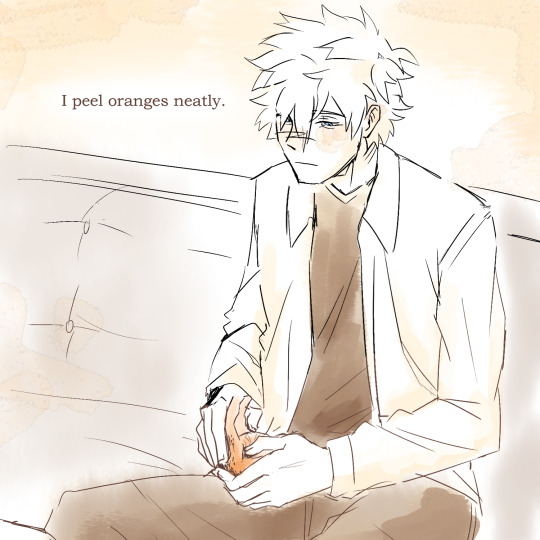


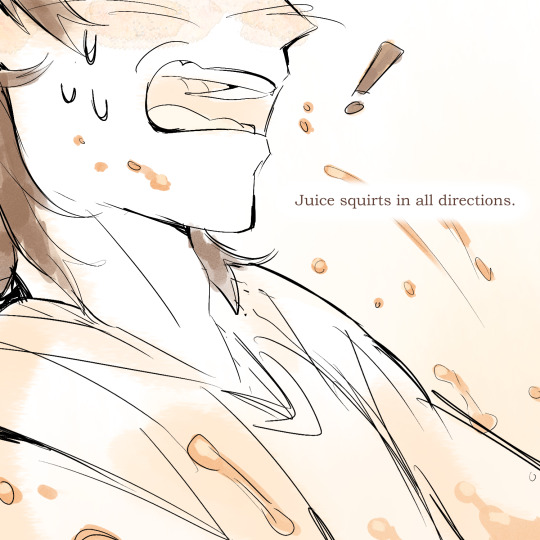

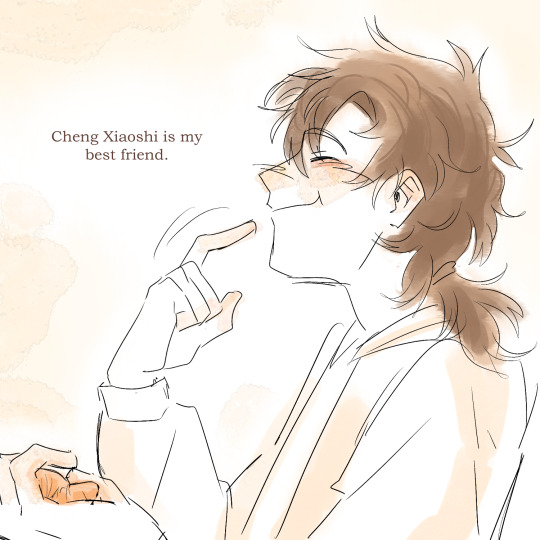
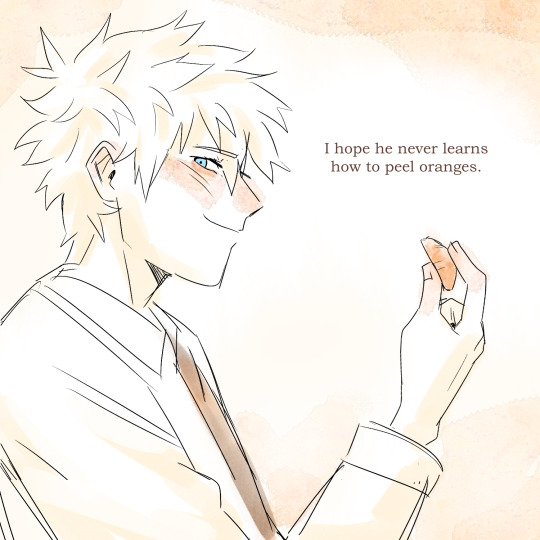
thought this poem by Jean Little fit these two a lot :))) slightly inspired by the lmk version by @ziaofender!
[ID: A Link Click comic which is done in shades of orange, with blue accents for Lu Guang's eyes. The narration, taken from "Oranges" by Jean Little and altered to fit, begins on Lu Guang peeling an orange with a neutral expression and saying, "I peel oranges neatly. The sections come apart cleanly, perfectly in my hands."
We see Cheng Xiaoshi struggling to peel an orange. Juice spurts out, and he yelps. "When Cheng Xiaoshi peels an orange, he tears holes in it. Juice squirts in all directions."
Cheng Xiaoshi tearfully hands the orange to an exasperated Lu Guang. His dialogue mixes with the narration: "'Lu Guang,' he says, 'I don’t know how you do it!'" Cheng Xiaoshi happily eats oranges. "Cheng Xiaoshi is my best friend." Lu Guang looks at him with a fond, sweet smile, also preparing to eat a slice. "I hope he never learns how to peel oranges." End ID]
#he says best friend but is that really the case????#that's up to you#i know what you are lu guang#i love them sm#link click#link click s2#lu guang#shiguang daili ren#time agents#cheng xiaoshi#shiguang#link click fanart#link click season 2#this took me so long#very worth it#SOOOO INSANE ABOUT THEM......#artilite#artilite doodle
3K notes
·
View notes
Text
spinning silk | writer's commentary
Hello! It has been a long journey but my Link Click fic, spinning silk, has come to a finish. It has been a joy to write and to share with you, and I really hope that you enjoyed the journey. I am so excited for you to read it now in its completion!
I thought it would be fun/interesting to include a writer's commentary about the story, as I've included elements that I'm excited about and would love to talk about the thoughts behind them, the history, foreshadowing, et cetera.
I will try to shy away from explaining too much in case we wanna preserve some level of the Author is Dead skskks . Happy to answer questions on a separate post or DMs though if there is interest! If you are interested in this commentary, please join me! If not, no worries and merrily we roll along.
Spoilers ahead!
The Epigraph
It's easy to miss the epigraph in this story, which is at the beginning of chapter 1 and is very brief. I don't know if anyone here is Chinese-literate, or if you popped it into a Translation app. If you have, you would have realised that the epigraph actually spoils the ending of the story!
A reminder of the epigraph:
君埋泉下泥销骨 我寄人间雪满头。 -Bai Juyi For his friend, Yuan Zhen
Bai Juyi and Yuan Zhen were famous Chinese poets from the Tang Dynasty, and good friends. Bai Juyi would have written this after Yuan Zhen died. The poem's translation is thus:
Your bones are buried under the spring mud; I remain in the mortal world with my hair white as snow.
In the context of this poem, white as snow can indicate someone growing old as they sit at the grave of their friend, therefore their hair turning all white. It can, depending on the translation, indicate someone who sat through the winter until snow layered upon their head , by the time spring comes. Or, in the context of Link Click, Lu Guang's white white hair. Which interpretation should it be? 🙂
Also fun fact I accidentally miscredited the poem for the longest time to Li Bai, another famous Tang Dynasty poet. Oops!
Silk
Ah, this story is built on silk. I think it is fairly famous, the 'red thread of fate' from East Asian/Chinese culture, the concept that you are somehow tied to your soulmate by a long, connecting red thread. I wanted to use the concept of thread as fate, but expand it beyond just about soulmates and relationships. That was the motivation behind depending on silk imagery for Liu Xiao's plan, to play on a well-established concept in Chinese mythology and add my own twist to it. Especially since Liu Xiao was the one in S2 to make the comparison, of people having a thousand parallel fates/threads.
As I was musing on an idea for this fic, that was when I happened to visit an exhibit that included the life cycle of a silk worm. My mother then told me how when she was little, she used to raise silk worms as pets. That got me to muse on the process of making silk--how you have to boil the cocoon and then unravel it slowly until it is a single, long thread. You have to be so careful with it because if it breaks it's kind of pointless, and how magnificent it is that such a cocoon could be so uninterrupted, singular, continuous.
Which brings me to the climax with Lu Guang, when he is trapped in a literal and figurative cocoon of silk. So as Liu Xiao had said (or at least, I think he said it...I forget lol)--when you make silk by boiling the cocoons, you kill the silkworm inside. Silkworms leave the cocoons by chewing a hole through it, which essentially renders the silk unusable because it's all chewed and broken, but now the silkworm is a moth and flies free. The thread of silk, the cocoon, must be ripped and ruined, only then can a silkworm emerge with wings, transformed. Only then can it live.
(Fun fact: one of the first things I knew I wanted from this story was the scene of Cheng Xiaoshi using his threads of fate to sew up all the ripped seams of time. That was, in many ways, the impetus of this story's idea--the image of him so selflessly giving up his own future and life to the act of something as gentle as mending)
Wen Xi
I loved writing chapter 2, honestly. Not only because I get to write about a dive, which is the charm and heart of Link Click, and not only because I get to write about my culture and province (Cantonese represent!) but also because in my eyes, the Wen Xi dive functions similarly to how I interpret the earthquake arc functions for canon.
There was a moment where I almost had a scene where CXS actually interacted with Wen Xi in person. He would have run into her at one point, and of course he can't act like he knows her because she doesn't realize he was the one who did the job for him, but he would have had a moment with her. She was sitting on the curb, struggling with some of the mangosteens she bought. He remembers how she doesn't like getting her hands sticky and wet and how Song Liming used to open them for her when they were kids, so he would have asked her if she needed help and gave her that little bit of kindness. This was ultimately scarpered so that he and Qiao Ling could have that more plot-driven moment of worrying over Lu Guang.
Other Deleted Scenes/changed scenes
Not so much a scene as it is a theme that I wish I could have expounded on more but ultimately couldn't figure it out. Which is to say, I wish I could have played around with Liu Xiao more. Liu Xiao, Lu Guang, and Li Tianchen are the trio who are manipulating fate and the future. They are also three characters who are, in their own way and for their own reasons, trying to use the control of time to answer for a painful trauma that they cannot bear to face full-on. For Liu Xiao, that flashback scene of Liu Min would have played a bigger role in the story. I wish I could have completed this, but at the same time, in my head in order for him to confront it is to own up to it, and find healing from it. He did not want to do that in the playground of my imagination. So I left him be.
Actually, Liu Xiao was supposed to be a little more villainous in this story! He would have been a bit more purposeful about Cheng Xiaoshi, knowing that CXS' abilities are causing the 'knot' in the silk and then intending for CXS to die alone/far from Lu Guang so that Lu Guang would not repeat the cycle. Ultimately I preferred Liu Xiao to be a bit more morally gray. He struck me as someone who didn't have a personal grudge against CXS at the end of the day. All he wants is his own peace of mind.
There was also going to be a moment, although I ended up scrapping it early on, where the photograph of Cheng Xiaoshi and his mother would have played a bit more of a role in the story. There would have been a moment where, upon discovering what Lu Guang was doing with the silks and realizing how much damage it was causing not only to him but to the world, Cheng Xiaoshi would have felt like he was the cause of all of Lu Guang's misery and now also the misery of the concept of time and space, since Lu Guang was essentially destroying the world because of him. In a moment of being in a pretty terrible head space, Cheng Xiaoshi would have half considered diving back into that photo as his mom and straight up Terminator his childhood self to save everyone the trouble. Qiao Ling would have strongly talked him out of it. Ultimately I felt that was, well, a bit dark, and not really fitting to the rest of the story.
Speaking of the photograph's purpose, the opening scene used to be a wee bit different, where Cheng Xiaoshi would actually give Qiao Ling the photo of his mother and ask her to hide it from him. He would never explain why, but Qiao Ling would have a guess as to what the reason was. I changed it because I wanted the story to have a bookend. It begins with Qiao Ling holding Cheng Xiaoshi as he slept to keep him warm. As does it ends.
Culture(???)
I'll be honest, I'm borne of expats, so I'm not the one to break down the traditions and culture of the characters. At the same time, I definitely was raised in Chinese culture and spent formative periods of my life in China, so there are a lot of things I take for granted and not think to explain when in fact it is not actually a universal experience.
But anyway! This is a section to explain my caveat. I am Cantonese. Link Click very likely takes place in a northern city. China's food culture is EXTREMELY diverse, so the food that I have eaten in China, because I spend all my time in a specific province, is probably food that Cheng Xiaoshi, Lu Guang, and Qiao Ling seldomly eat! But I couldn't help myself, so I wrote about my favorite foods. Because I write fic for ME.
That also goes for the daily living aspect as well. For all I know, Cantonese doctor visits, city walking, food delivery, groceries, etc. are the same as Northerners. For all I know, it could be wildly different! I have no idea. I do reckon though that our trio live in a quieter, smaller city than what I'm used to. I mean, look at their neighborhood.
Not regarding shanghuo, though. Shanghuo is everywhere in China.
Anyway, a quick rundown of things:
black sesame porridge: A very Cantonese sweet porridge. Technically considered dessert, but also lauded to be full of nutrition. Technically considered 'soup' but I write fic for me.
Also, black sesame soymilk. Soymilk is great.
Sun Wukong- LG compares himself, or wished to compare himself, to Sun Wukong escorting Tang Sanzang to the west. This is in reference to our beloved Monkey King in The Journey to the West! He is an iconic literary figure dating back to idk I think the 1400s or something and his story is quite long and mythical but long story short his mission was to escort a monk westward, towards South Asia, to collect some important scripts. He had to protect Tan Sanzang from all sorts of demons and devils along the way.
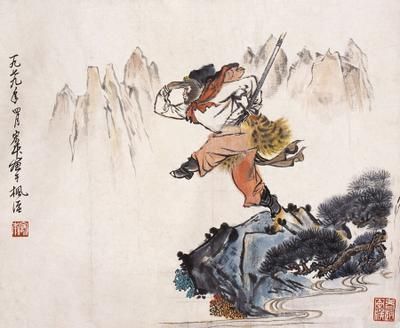
Pixiu- Lu Guang makes a passing comment in his point of view about putting a Pixiu at his doorstep and hoping it pays off Cheng Xiaoshi's debt. Pixiu is a little guy (arguably dragon, probably not) that likes to gobble up gold. If you put a little Pixiu statue in your area, the idea is that he will bring wealth to you. He's got a whole story about him where he ate up all the gold of the heavenly palace and the Jade Empress was so mad she sewed up his butthole so he would have eternal constipation, or something like that. Don't correct me if that's wrong because that's how the story was told to me and I delight in it LOL. I love him. He's my favorite idiot.
Clay pot rice -Also a very Cantonese dish. Frankly, the rest of China is missing out if it is only contained in the Canton province. Rice that is cooked with meats in a clay pot which makes the rice v ery aromatic and deliciously crispy around the sides. Qiao Ling was NOT going to take that out for takeout, that girl was 100% just gonna treat herself in a restaurant and CXS was gonna have to deal with scraps and leftovers.
Zhinü- I'm realizing that Lu Guang makes a lot of references in his internal monologue LOL. This is in reference to the Weaver Girl and Cowherd folktale, one of China's Four Great Folktales (which include Lady Meng Jiang, Legend of White Snake which is my personal favorite, and the Butterfly Lovers). It's a very classic Chinese story about a celestial weaver girl, Zhinü, who is the daughter of I think the Jade Emperor who is like the heavenly king of gods, and her lover the mortal cowherd. Long story short, her father was unhappy that she fell in love with a mortal and so separated her from her husband and children with the Milky Way. One day a year, the birds take pity on the lovers and form a bridge across the galaxy so that they can reunite. Between her and Lu Guang's weaving--or rather, spinning silk--I couldn't pass up the opportunity to make a reference.
yangmei wine - Liu Xiao is drinking some Yangmei wine. Yangmei is a type of fruit in China and I am pretty sure I actually made him drink a different wine than what I'm imagining. What I intended for him to drink is a wine that is made of a particular fruit that isn't strictly speaking edible, or at least not eaten for enjoyment. It's usually always only used for making wine, and you let the little plums (so t ospeak) soak in the alcohol until it is a bright red. Very sweet. Very strong.
Sanmao- At one point Lu Guang compares Cheng Xiaoshi to Sanmao because Cheng Xiaoshi had a small sliver of hope for his parents snatched right from underneath his nose. Sanmao is an iconic Chinese character from a long-running comic that began in the 1930s. He is a poor orphan boy during the era before and during WWII, who is just trying to survive extreme poverty. He is often mistreated by passerbys and is very lonely, often looking longingly at other kids who have food to eat and have parents. Every time someone treats him with kindness and he has just a little bit of hope that he can have a family or some good fortune, some awful circumstance happens, usually tied to tense socioeconomic injustice or war.
One of the less traumatic panels of the comic lol:
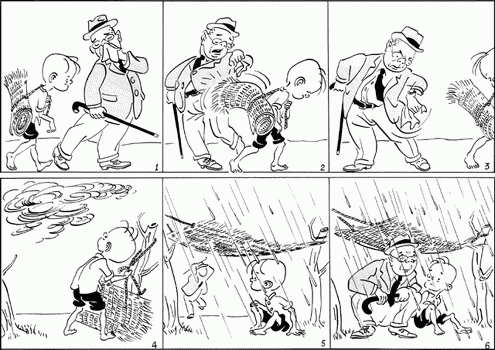
Jiuzhaigou- Cheng Xiaoshi mentions wishing that he could go there one day, and then at the end Qiao Ling and Lu Guang say that they will go together. Jiuzhaigou is in the Sichuan province, it is a nature realm that is very beautiful. There are natural deposits that make the lakes ultramarine blue and crystal clear. It's so beautiful! A photographer's dream.
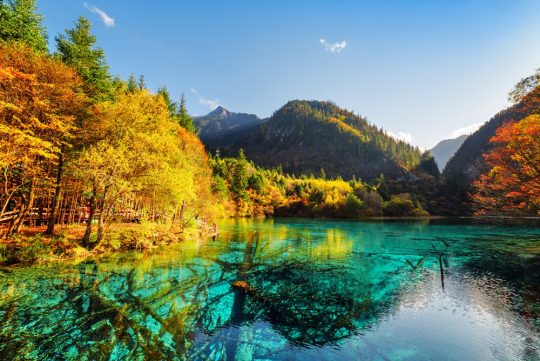
Tangyuan- sweet and sticky rice dumplings that can be filled with sweet filling such as peanuts, black sesame paste, sweet egg, or more! They are often eaten during holidays, both during Winter Solstice and the 15th day after Lunar New Year. Indeed they are symbolizing family togetherness, although less because of stickiness and more because of a pun in their name. But maybe stickiness has something to do with it? Winter Solstice foods in different regions of China are also somewhat sticky, even if they don't typically eat tangyuan. I just know what I'm told lol.
Doraemon-A popular Japanese manga/anime from the 50s or 60s that is immensely beloved by the Chinese to this day. He is a robotic cat from the future with a fourth dimensional pocket full of futuristic gadgets that he uses to help Nobita, a fourth grader in the 50s, with his every day problems. He's wonderful. Also, he has a time machine which is tucked in Nobita's homework desk. Fitting....
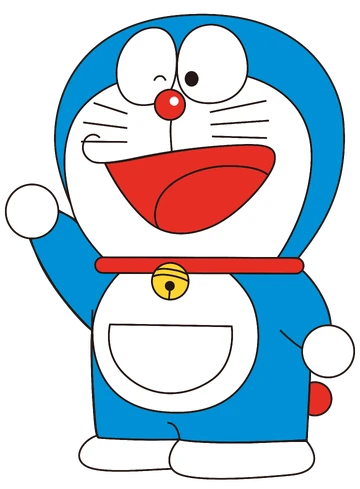
Yixiu- Another popular Japanese anime, I believe from the 80s, that was also quite popular in China. It's about Ikkyu-san, a little monk/prince whose profound wisdom solved all sorts of grown-up's shenanigans.
Jiejie- A reader had asked the significance of Cheng Xiaoshi calling Qiao Ling this in the penultimate so I figured I'd bring it up here as well. 'Jie' is an indicator of older sister, or a bit of a respectful but also affectionate term for a young woman. Just like how Lu Guang calls Qiao Ling 'Qiao Ling jie' in the show. When he does it, it's friendly but also not actually meaning that he sees her as a sister sister because it's attached to her whole name. Cheng Xiaoshi in this story, not necessarily canon, refers to her as Ling jie every now and then. To me, this is him hearkening to childhood terms, as that is what his parents would refer to her as when he was growing up.
Take this with a grain of salt because I am a diaspora and not originally from the culture. Qiao Ling referring to Cheng Xiaoshi as 'didi' (little brother) in the show, and in the end Cheng Xiaoshi calling Qiao Ling 'jiejie' (big sister) in this fic are not rare, so to speak, or inappropriate, but you don't typically refer to someone who isn't related to you as your 'didi' or 'jiejie' unless they are blood related to you. You can call your sibling this, or your cousins this, but uuuuusually not someone who is like a sibling to you--singularly, yes, like Ling jie, but not typically Jiejie. Them calling each other this means that they truly see each other as their sibling. Also, those terms are a little bit childlike, so to speak. There are more 'grown-up' ways to refer to your little brother or big sister. In Cheng Xiaoshi's case, someone his age will probably refer to a sister as 'a jie' or 'jia jie'--at least, in Cantonese this is the case. 'Jiejie' is a little kid's way of calling their sibling. Like, up until I was about 7 years old I would have referred to my sister this way. To call someone 'jiejie' now, particularly to their face, I feel is a very vulnerable address. It's like if you as an adult who usually calls their mother 'Mom', in a time of deep distress or sadness and in need of comfort, revert to calling her 'mama' or 'mommy'. Like, you're both probably in tears to get to this point. At least, that is my experience with addresses, and therefore Cheng Xiaoshi's lol. Any fellow sinos out there can correct me but that was my intention for that part of the story. Cheng Xiaoshi is vulnerable, and he is seeking comfort from his big sister.
Mama's nursery rhyme- The story of the little rabbits and their Mama Rabbit is a very well known children's story in China. The story wasrecounted as close to memory as I can, so the only other thing I can say about it is that this is how the song goes.
Well, that's all I can think of right now! If there are any questions or you're curious about something, feel free to send me a message! Otherwise, I hope I didn't resuscitate the author too much.
56 notes
·
View notes
Text
You make a pretty picture
Monkey OC Xiaoshi and pairing concept by @quitealotofsodapop

"Roger and Jessica Rabbit situation on both sides" fcuyghu take my money. I'm going to explode
+ poem




#anyway my first ship art#they're rottenly sweet they're precious they confuse everybody#pyrographyshipping? charcoalshipping?#tsats draws#fanart#monkey king netflix#monkey king 2023#monkey king 2023 red girl
64 notes
·
View notes
Note
[ehehehe i came up with a poem]
"You make a pretty picture" - you say
...
Though you're the one who's in stripes!
Surrounded by brushes and plates -
I look at your juggling movements
And those neatly stroked straight lines
I break some of willow branches
And make charcoal in my hands,
So you can make a picture
Using my present for lines
AWW
Red Girl improvs a poem like that and Xiaoshi is just stunned at her word mastery. He can barely verbalise how he feels sometimes - he translates it into visual arts - so he gets *knocked tf out* when he hears verbal affection.
Red turns her head for a second and looks back to see the entire ground around her in a mandala of love hearts, cus thats the easiest way for Xiaoshi to express how he feels about her. <3
#monkey king netflix#monkey king 2023#jttw inspo fan children#jttw inspo ocs#pyrographyshipping#charcoalshipping#red girl
13 notes
·
View notes
Text
X for Xiaoshi #NaPoWriMo2021
X for Xiaoshi #NaPoWriMo2021
Xiaoshi,(xiao – little/small, shi – poetry) is a genre of Chinese poetry which came into being in the 1920s from the so called “short poetry movement’. It is also known as the ‘Chinese Haiku‘. Xiaoshis are about presenting vivid yet unconnected images together. These metaphors or pictures just have to have a tiny bit of causality. This form is usually written as a quatrain. For more on this…
View On WordPress
#chinese#chinese haiku#chinese poetry#NaPoWriMo#napowrimo poetry#napowrimo2020#napowrimo2021#Poem#Poem of the day#poems#poemsporn#Poet#Poetry#Poetry Forms#Wordpress Poems#wordpress poetry#wordpress poets#wordpress writers#xiaoshi#xiaoshi Poem#xiaoshi poetry
5 notes
·
View notes
Text
20210921
Miss autumn YUZHOU HINTS
Huang Xiaoxuan. Why do you edit three times? Just because the last one had exactly the same expression as Minami Komuro? Shouldn't you recognize me, the two small rooms have also loved me for a long time. Can't stand 😂🚬
The more I look at it, the more I feel that the person in Xu Chuchuo's hand is the moon and the boss's head in the old size. The third country is the moon and the boss's month is the country where luck is p. Under the same bright moon, I miss my treasure. Cherish the meaning of love and beauty🍒🎑
Yep. The mooncake you have arrived at are delicious. I'm not satisfied😂
I know that there are three gentlemen’s clothes in advance.🤣
Sing you honestly. Are you trying to send a telegram with Huang Renmin's work hall? 😂😂 they both studio and the owner of the account is too cute 😍
Boiling Water Song, did you ask who has eaten the moon? Huang Xiaoxuan, who do you want to remember to eat the moon Buddha? Take it on the side. Our department is rich in gold, so please follow the telegram.🚬
2The Mid-Autumn Festival brings the small real card point 3:14 (I love you forever). A video title is released in the market. The title is limited to scary things. At the end, there is color volume. Let’s take a look at Xu Xiaoguan.
see it? Home is a person is like the Tao, "people do you just choose this font?
Like Shenyang, the translation of the whole poem is given to you. But in the same round of Acacia under the bright moon, "I miss you
Huang Xiaoshi releases a blog at 18:29 to transfer people to the country
Two small announcements for the family to return to the country alone? You two camp.🙈🙈
the conclusion is
" you are home and i am your man "
Cr. watermark
#timmy xu#jhonnyhuang#history#huangjingyu#music#photography#television#movies#yuzhou#xu weizhou#yuzhoucouple#yuzhoushangyin#hints#midautumnfestival
2 notes
·
View notes
Text
xiaoshi
i am enslaved to the short poem or '*xiaoshi' as they were called in the 1920's. most of my happenings are scattered, or fragmented. i do not apologize for dumping the puzzle pieces of my mind in these mini-poems.
0 notes
Text
Chinese tea culture and the influence
The Chinese people, in their drinking of tea, place much significance on the act of “savoring.” “Savoring tea” is not only a way to discern good tea from mediocre tea, but also how people take delight in their reverie and in tea-drinking itself. Snatching a bit of leisure from a busy schedule, making a kettle of strong tea, securing a serene space, and serving and drinking tea by yourself can help banish fatigue and frustration, improve your thinking ability and inspire you with enthusiasm. You may also imbibe it slowly in small sips to appreciate the subtle allure of tea-drinking until your spirits soar up and up into a sublime aesthetic realm. Buildings, gardens, ornaments and tea sets are the elements that form the ambiance for savoring tea. A tranquil, refreshing, comfortable and neat locale is certainly desirable for drinking tea. Chinese gardens are well known in the world and beautiful Chinese landscapes are too numerous to count. Teahouses tucked away in gardens and nestled beside the natural beauty of mountains and rivers are enchanting places of repose for people to rest and recreate themselves.
China is a country with a time-honored civilization and a land of ceremony and decorum. Whenever guests visit, it is necessary to make and serve tea to them. Before serving tea, you may ask them for their preferences as to what kind of tea they fancy and serve them the tea in the most appropriate teacups. In the course of serving tea, the host should take careful note of how much water is remaining in the cups and in the kettle. Usually, if the tea is made in a teacup, boiling water should be added after half of the cup has been consumed; and thus the cup is kept filled so that the tea retains the same bouquet and remains pleasantly warm throughout the entire course of tea-drinking. Snacks, sweets and other dishes may be served at tea time to compliment the fragrance of the tea and to allay one’s hunger.
The formation and development of Chinese tea culture
China is the hometown of tea, is the world’s first discovery of tea, tea and the use of tea cultivation countries. The origin of tea at least the main Qi Wannian history. Tea was found and the use of human, about Siwuqiannian history.
In accordance with “The Book of Songs” and other relevant documentation, in the pre-history, “Tu” refers to all types of wild plants bitterness of food raw materials. Fresh medical unity in the history of the times, the Zhike tea vegetable oil, the Qing God, Xiaoshi, in addition to Zhang, the medical function is to facilitate wait until it is not difficult for people found. However, the general medical practices for the development of an exclusive drink often, there must also be some special factors, namely, real-life people in a particular need. Bashu region, to the multiple for Jiyi “Zhang smoke” land. “Barbarian people living with tea, the lack of will.” (Ai Qing weeks of “Zhu Guo Travels” Volume II) is often vulgar Bashu people eating spicy side, thousands of habit, still. It is this natural geographical conditions and the resulting decision of the people’s dietary practices, making Bashu people first “JIANCHALING” Apart from taking to Zhang Qi, antipyretic drugs. Jiufu-Xi, a medicinal purpose gradually Subduction, tea has become a daily drink was. Qin-Ba-Shu is likely to see this as a daily drink tea customs.
Tea from the medicinal drink into a regular habit, the strict sense of “tea” would then have its typical signs that “tea” (cha) the emergence of sound. Guo Pu Note “Yi-release”, “Jia���: “small trees such as gardenia, Dong-Sheng Ye, can be boiled for soup to drink. As early as today called for the mining, tea, who was admitted late Ming, a Chuan, Shuren of the TU. “Clearly, the Han,” Tu “has been specifically beverage word” tea “in pronunciation,” tea “from” Tu “isolated, and embarked on the” independence “road of development. But “tea” the emergence of the word is accompanied by the development of the tea things and commercial activities have become increasingly frequent, until later in the Tang Dynasty, is also in line with the new symbol of a people’s social life after such a text change in the law.
China will start from the tea, There are different theories about, the Western Han Dynasty, tea drinking has been a matter of the official literature, drinking tea when the starting time earlier than some. Tea appears to cultural characteristics, in the Han, Wei and Jin Dynasty, Northern and Southern Dynasties period.
Tea Culture Broadly speaking, the tea at the natural sciences and humanities tea in terms of both human society is in the process of the historical practice of creating and tea-related material and spiritual wealth combined. In a narrow sense, focusing on the human sciences tea, tea mainly refers to the spiritual and social functions. As the science of tea has become an independent system, which now often say the tea culture emphasis on the humanities.
The influence of tea culture on Chinese civilization
1、the three countries before the tea culture of the Enlightenment
Many of the books found that the tea set for 2737-2697 BC, its history can be pushed to Sanhuangwudi. Eastern Han Hua, “The Fresh”: “Kucha for food, meaning benefits” of the medical records of the value of tea. Western Han Dynasty tea to the country of origin named “Tu-Ling”, that is, Hunan Chaling. To San Guowei generation “-Blair” has the earliest documented the method of tea cakes and drinking: Story of the Pakistani Inter-for cake, a pie-old man leaves to a paste of rice. Tea in the form of material and infiltration to other human sciences and the formation of tea culture.
2、Jin Dynasty, the seeds of the Northern and Southern Dynasties tea culture
With the rise of the literati tea, the tea poetry Gough increasingly available, tea has been out as a general form of eating into the cultural circles, will play the spirit of social role. Jin Dynasty, Northern and Southern Dynasties period, Menfa system has been formed, not only the emperor, nobility amassed a wave of officials and scholars generally proud boast, multi-effect Plaster Liang Hou Wei. In this case, some people of insight to “Yang Lian.”
Thus, there is satisfied that the land, Huanwen to tea and wine at all. South Qishizuwu emperor is a relatively enlightened Emperor, he did not Hei Yu Yan, under Yi Zhao before his death, he said after the funeral to be thrifty as possible, not to Sansheng for offerings, only put more Ganfan, fruit cake and Chafan can. And to “the world Guijian, with such a system.” Satisfied that the land, Huanwen, Emperor Wu Qi, where tea is not only refreshing to quench their thirst, it began work in a community, into a tea hospitality, to worship and that a Kind of spirit and sentiment of the means. Tea has not entirely the use of its natural value used by the people but entered the spirit of the area.
Wei, Jin and Southern and Northern Dynasties period, the world disorder, all kinds of ideological and cultural exchanges collision, supernaturalism very popular. Metaphysics is the period of the Wei, Jin, a philosophical idea, mainly糅合Confucian thinking of the Lao Zi and Zhuang Zi-yi. Xuan Xuejia most of the so-called Fellows, the first to the door, the face, the instrument only, Hyun-loving nothingness from the light. Eastern Jin Dynasty, furans North Korea, the affluent Kangnam Scholars to be temporary to meet, hang around all day in Qingshanxiushui between the light winds to continue to develop, resulting in many light homes. Initially, there are more than idle talk Jiutu home, and later, talk of the wind gradually developed to the general literate.
Xuanxue Jia-speech, also general-talk rhetoric. Liquor make people excited, but drinking more would be stricken manner, nonsense, failed Yaguan. The tea-drinking and may be Jingri always clear, it is clear thinking, calm attitude. Moreover, the general terms of the literati, the whole day dealing with Jiurou, of the economy, will not allow. Days, many Xuan Xuejia, talk to wine home from the village. In them, where tea has been treated as a mental phenomenon.
With Buddhism, Taoism up, and have tea and Buddhism, Taoism linked. In Taoism, the tea is to help Lian “inner alchemy” or-down muddy, light-weight-for-bones, Xiu Changshengbulao a good way to the body in Buddhism, the tea is a brooding meditation required of Of the show. Although this has not yet formed a complete religious tea ceremony and the ideological principles set out tea, tea has been divorced from the diet as a form of state, has significant social, cultural functions, the Chinese tea culture clues.
3、the formation of the Tang Dynasty tea culture
780, Lu Yu, “the tea,” tea culture of the Tang Dynasty is a landmark. Tea has summed up its natural and human sciences double content of the tea arts, Confucianism, Taoism, Buddhism into the three tea, the pioneering spirit of the Chinese tea ceremony. After tea and a large number of books, poems tea, “tea in”, “JIANCHALING water”, “Cai Cha”, “16 soups.” Tang tea culture and the formation of the Zen on the rise, the benefits of tea is refreshing thought, spermatogenic Zhike function, the temple advocates tea, tea trees planted around the temple, the development of the tea ceremony, a tea appear, the first election of tea, The matter was tea activities. China’s Tang Dynasty in the form of tea ceremony at the palace tea, the tea ceremony of the temple, the literati tea ceremony.
4、 the prosperity of the Song Dynasty tea culture
Song tea has been a great development, and promote the development of the tea culture, the literati in a professional Tea Associations, an official of the “social soup”, a Buddhist, “1,000 clubs.” Song Taizu Zhao Kuangyin tea is an of disabilities, in court and authorities in the establishment of tea things, the court has been using tea grades. Tea-ceremony system has become, thanks to the win over Secretary of tea has become the emperor, with relatives an important means, but also give foreign envoys. As for the lower social and vitality of tea culture is more lively, some of movement, the neighbourhood to “Xiancha” You Ke, to respect the “gold ingot tea”, when engaged to “tea”, the time of the marriage to “the tea”, when roommate “A tea.” Cha Doo civil wind has brought Preparing cooking point of a series of changes.
Since the Yuan Dynasty, the tea culture has entered a period of twists and turns. Song expansion of the tea culture and the social dimension of cultural forms, tea things are booming, but the tea to complicated, trivial, luxury, lost the Tang Dynasty tea culture profound ideological connotation, too delicate tea flooded the spirit of the tea culture, lost Its noble profound nature. In court, nobles, scholars there, drinking tea became a “drink at the child” and “drinking style,” and “Play tea.”
5、 that the universal culture of Qing-Cha
At this point there has been steaming green, Chaoqing, Hong Qing, and other tea, tea drinking has been changed to “minority bubble”, many of the Ming Dynasty scholar Aston handed down the left for, such as snow star “Pengcha picture,” ” Tea map “, Wen Zhengming’s” Huishan tea party “,” Lu Yu Pengcha plans, “Tea plans. ” The increase in tea, tea art is different, the style of Tea Ware, texture, pattern Qianzibaitai. Tea exports to the Qing Dynasty have become one of the official sector, the tea, tea, tea countless poems.
6、 the development of modern tea culture
After the founding of New China, China’s annual output of tea from 1949 to 7500 T development in 1998, more than 60 million T. Tea a substantial increase in material wealth for the development of China’s tea culture to provide a solid foundation in 1982, set up in Hangzhou, the first to promote tea culture for the purpose of social groups – the “tea house”, established in 1983 in Hubei ” Lu Yu Tea Culture Research Society, “1990” were the Federation of Chinese tea “was set up in Beijing, 1993,” the China International Tea Culture Research Society “in the establishment of Island Lake, in 1991 China Tea Museum in Hangzhou West Lake Township officially opened. 1998 China International Tea Cultural Exchange Peace Museum completed. With the rise of tea culture and tea houses throughout the run more.
International Tea Culture Symposium has been opened to the fifth sector, has attracted Japan, South Korea, the United States, Sri Lanka and Hong Kong and Taiwan has participated. The main provincial cities and counties in the tea production in the host “Tea Day”, such as Fujian’s Wuyi Yancha section of the city, Yunnan’s Pu’er tea festival, Zhejiang Xinchang, Taishun, Hubei and Britain Hill, the Tea Festival in Xinyang, Henan abound. To have tea as the carrier, to promote comprehensive economic and trade development.
Chinese tea culture and tea culture in Europe and America or Japan, a great difference. Chinese tea culture has a long history, profound, not only contains the material and cultural level, also contains a deep spiritual level. Tea by Lu Yu of the Tang Dynasty in the history of Chinese tea culture and sounded the horn. Since then, the spirit of tea permeates the court and society, into the Chinese poetry, painting, calligraphy, religion, medicine. For thousands of years, China has not only accumulated a great deal about tea cultivation, production of material culture but also accumulated rich spirit of the tea culture, which is unique to China’s tea culture, a cultural study area.
11 notes
·
View notes
Text
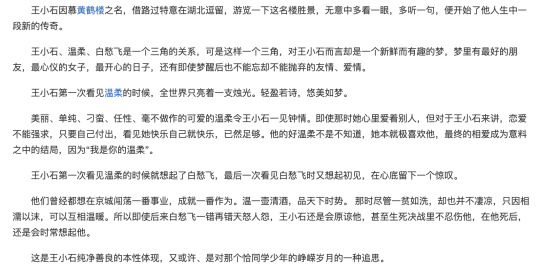
All because Wang Xiaoshi admired the Yellow Crane Tower of renown, he took advantage of his passing travels to specifically stay in Hubei and view the wonderful scenery of this famous tower. Because he inadvertently took an extra glance, and heard an extra word, so began a new and legendary chapter of his life. Wang Xiaoshi, Wen Rou, and Bai Choufei are in a triangular relationship. But this kind of triangle, to Wang Xiaoshi, is in fact a novel and interesting dream; in this dream exists the best friends, the woman he admires the most, and the happiest times, as well as the kind of friendship and love that one cannot forget or abandon even after waking up. The first time Wang Xiaoshi saw Wen Rou, the entire world was illuminated by the single flame of a candle. As graceful as a poem; as distant and beautiful as a dream. The lovely, innocent, rude, willful, and genuinely adorable Wen Rou caused Wang Xiaoshi to fall in love at first sight. Even though at that time, she loved someone else in her heart, but in Wang Xiaoshi’s eyes, romantic love cannot be attained through force; it is only a matter of what he gives. Seeing her happy made him happy; that was already enough. It was not that Wen Rou did not know of his redeeming qualities. She liked him very much to begin with; their mutual love at the end was an expected result, because “I am your Wen Rou.” The first time Wang Xiaoshi saw Wen Rou, he thought of Bai Choufei. The last time he saw Bai Choufei, he thought again of their first meeting; it left a notable mark at the bottom of his heart. They once wanted to achieve a great career in the Imperial City, and attain a great accomplishment. Warm a pot of sake; judge the current events of the world. At that time, even if they were destitute, they were in fact not desolate, all because they helped each other during such humble circumstances and could keep each other warm. So, even when, later on, Bai Choufei made mistake after mistake and incurred the wrath of the heavens and the anger of men, Wang Xiaoshi still would forgive him, and even in a fight to the death, could not bear hurting him. After Bai Choufei’s death, Wang Xiaoshi would still frequently think of him. This is how Wang Xiaoshi’s pure and kind-hearted nature exemplifies itself. Or perhaps, it is a reminiscing of exactly the most memorable years of youth.
王小石与温柔、白愁飞 Wang Xiaoshi and Wen Rou, Bai Choufei from Wang Xiaoshi's Baidu page
Any mistakes are my own.
#说英雄谁是英雄#heroes#wang xiaoshi#wen rou#bai choufei#choushi#wangbai#shirou#my translation#SORRY I JUST.#ZSX YOUR FUCKN CHARACTERS#even at the end WXS forgave BCF#no matter how many times LLH lied to him FDB still forgives him#I CANT I CANT I CANT THEYRE SO GOOD#theyre just so fundamentally good#even if having such an open heart means they'll get hurt#they wont ever close it to the world
10 notes
·
View notes
Text
AAAAH!! THIS IS SO GOOD!! It always stunsne when people just make stuff inspired by my ramblings! /positive
I love the details on Red Girl's dress and her hair, and ofc Xiaoshi painting and twirling his brushes to the beat of her improv poem. <3
That feel when you're both the kids of super-powerful entities, everyone is afraid of you, and you're both dorks.
+I love how Red Girl almost towers over Xiaoshi, like a pillar of flames. And he's a messy monkey boy, madly in love.
I love the ship name ideas too. The feel when your gf an endless source of free charcoal for art + she uses her flames to write out cute af messages in wood.
You make a pretty picture
Monkey OC Xiaoshi and pairing concept by @quitealotofsodapop

"Roger and Jessica Rabbit situation on both sides" fcuyghu take my money. I'm going to explode




#monkey king netflix#monkey king 2023#others art#red girl#jttw inspo fan children#fanart!!#charcoalshipping#pyrographyshipping
64 notes
·
View notes